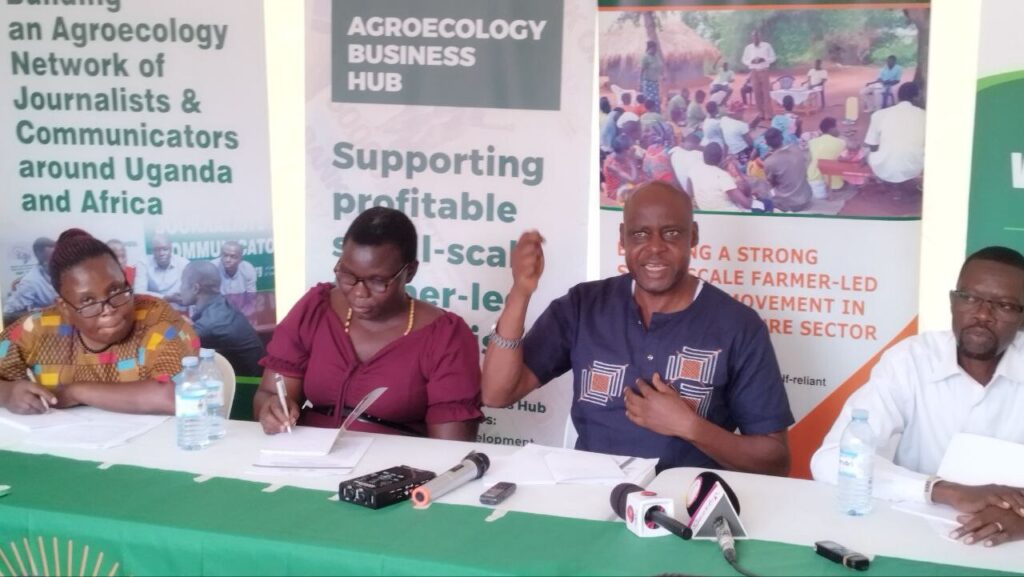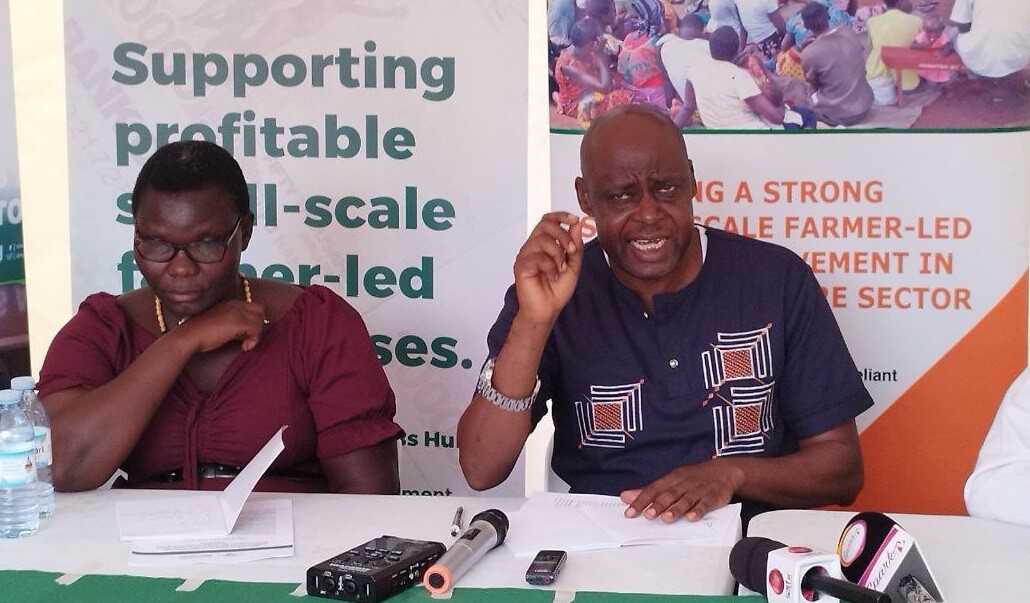Kampala, (UG): Ugandan small scale farmers have cried out to potential donors and agencies to help in conservation of the environment with an increased funding for the protection and promotion of agroecological practices that conserve the water bodies.
“The government should also increase access to financial access, enhance infrastructure, improve information sharing, and create climate-resilient farming techniques by promoting sustainable agroecology practices such as rainwater harvesting, small dam construction, Soil and water conservation techniques, etc,” Eastern and Southern Africa Small-scale Farmers’ Forum (ESAFF) Uganda, an umbrella body of the farmers revealed on Monday, October 16, 2023, as Uganda joined the rest of the W to commemorate the International World Food Day held under the theme; “Water is Life. Water is Food.”
The 2023 World Food Day this year focuses on “emphasising the fundamental role that water plays in our ability to nourish the world’s growing population.”
Speaking to journalists at ESAFF offices in Ntinda, Kampala, Mr Hakim Baliraine, the National Board Chairperson ESAFF Uganda revealed that the country is faced with limited water sources available to provide clean drinking water to the entire population, yet alternative surface water sources are often highly polluted, and infrastructure to pipe water from fresh, clean sources to arid areas is too costly.
“Dangerous industrial farming practices like Industrial (chemical-intensive) farming that destroy the quality of water and endanger the aquatic lives of different species, soil degradation when the chemical leaches, and cultivation in swamps and other water resources,” said Mr Baliraine, adding that this, coupled with the unpredictable climate change in the country exacerbates water scarcity issues, with irregular rainfall patterns, prolonged droughts, and flooding events threatening crop yields and food security.
Additionally, the ESSAF Uganda Board Chairman said that small-scale farmers in Uganda also face hurdles of limited access to finance, challenges in accessing credit and other forms of finance to boost production.
“We, small-scale farmers, struggle to invest in their farms and improve their productivity without adequate financing. Many small-scale farmers often suffer from poor infrastructure as most live in rural areas with poor infrastructure, including inadequate roads and limited access to water for agricultural production,” he said.
He, therefore, advocated for the adoption and promotion of agroecological practices countrywide to help in the preservation and conservation of the natural water sources which in turps helps them improve on their agricultural productivity.
“Through agroecology, we, small-scale farmers, are able to produce sustainably while protecting soil and the environment. We, small-scale farmers, are essential to maintaining biodiversity because we frequently cultivate a variety of crops, which helps to preserve genetic diversity and offers protection against crop failure,” Mr Baliraine said during the presser.
“Additionally, we, small-scale farmers, frequently employ more environmentally friendly farming techniques like crop rotation and organic pest control, which can help maintain the health of the soil and lower the need for hazardous pesticides and fertilizers,” he added.

Meanwhile, the National Vice Chairperson ESAFF, Ms Margaret Masudio speaking at the same press conference proposed to government the need to prioritize and protect water resources by ensuring they are used wisely and equitably to feed a growing world population.
With this, Ms Masudio says Ugandan as a country can “combat hunger, promote sustainability, and work towards a future where no one goes to bed hungry.”
She also tasked the government and stakeholders in the agricultural industry to promote access to water for agricultural production so as to increase their production and profitability to provide food for future generations.
Through the Ministry of Agriculture, Animal Industry and Fisheries (MAAIF), Ms Masudio says the government can consider subsidising the small irrigation system powered by solar to make it affordable for all farmers.
ESAFF Uganda also called for a ban on the importation and use of toxic chemicals that damage the quality of water resources, and instead promote the practice of agroecology to ensure that water is protected as a component of an agroecosystem.
Despite Fish Farming being one way of earning for the farmers; the farmers forum decried the infiltration of illegal cage fish farming which ends up polluting the water bodies, and urged the Agriculture ministry to come out strongly to regulate this practice
“The government should put strict penalties on companies and individuals polluting our water bodies. NEMA shouldn’t look like a compromised entity let them not spare anyone when it comes to the protection of our natural water catchment areas if we are fighting the challenges of desertification and desilting.”
World Food Day is an international day celebrated every year worldwide on October 16 to commemorate the date of the founding of the United Nations Food and Agriculture Organization in 1945.
This year’s World Food Day commemoration comes just a day after the International Day for Rural Women, commemorated under the theme Digit ALL: Innovation and Technology for Gender Equality. Rural women’s role in preserving natural resources can’t be underestimated.
On that note, therefore, ESAFF Uganda, through the ESAFF Women Forum has called for addressing all inequalities against women and ensure their inclusiveness in the farming practices across the country.
Other officials from ESAFF Uganda who attended the Monday press conference included; the General Secretary – Mr Emmanuel Tumushiime, the Forum’s Publicity Secretary – Ms Beatrice Katsigazi, , the National Treasurer – Mr Ronald Reagan Nyeko, and other Board Members including; Ms Beatrice Pangani, Ms Christine Okot, Ms Irene Nakijoba, and Ms Abraham Ojangole.
Founded in in 2002 to facilitate processes through which small-scale farmers’ development concerns can be solicited and addressed, ESAFF Uganda is currently present in 54 districts countrywide, and is also part of a bigger network of small-scale farmers in the other 15 countries in eastern and southern Africa.
If you would like your article/opinion to be published on Uganda’s most authoritative news platform, send your submission on: [email protected]. You can also follow DailyExpress on WhatsApp and on Twitter (X) for realtime updates.



